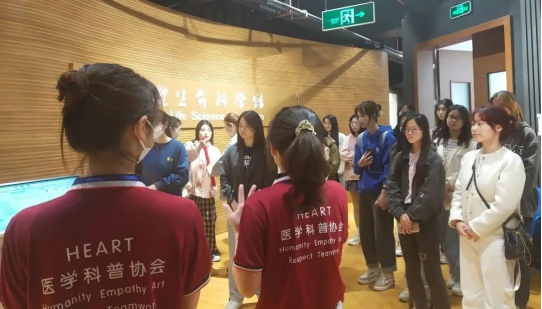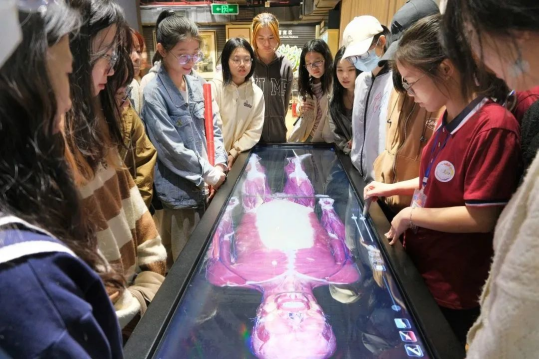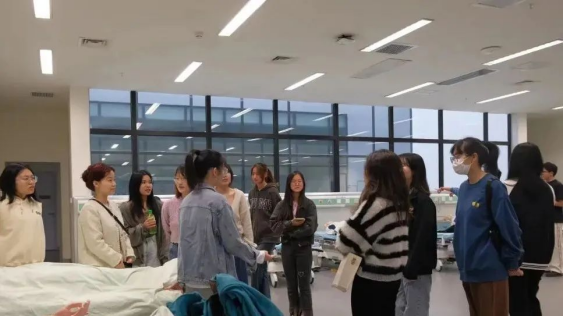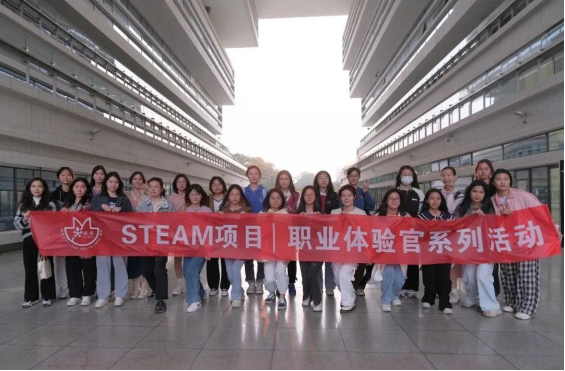What is medicine? What kind of profession is a doctor?
Medicine is a specialized field of study that deals with diagnosing, treating, and preventing various illnesses or abnormalities of the human body.It is a science that aims to promote the recovery of patients' health and improve their overall well-being.
On March 19, 2023, Esther Hall hosted aCareer Experience Officer series event focused on Medicine, where students visited the medical building of Shantou University and gained first-hand experience of the daily work of medical professionals. The main objective of the event was to deepen the participants’ understanding of the medical profession and to encourage them to reflect on the value of life.

The intricacies of the human body areunparalleled works of art in the world. Its precise organization and exquisite design are nothing short of a testament to the marvels of life.
The Human Life Science Museum showcases the wonders of life through the display of preserved human specimens, exudinga passion for the preservation of life.
Visiting the medical building provides students withmore than just knowledge of human anatomy; it also fostersa sense of humanistic empathy.
Hippocrates, the father of ancient Greek medicine and the pioneer of modern medicine, once said, “A physician is endowed with three gifts:the knowledge of language, the knowledge of medicine, and the knowledge of the knife.”
This quote highlights the importance of language in medical practice. Whether in the past or present, medical professionals must have strong communication and language skills in order to provide effective care, illustrating that medicine is also a branch of the humanities.
If medical professionals lose sight of the humanistic aspects of medicine, they risk losing its essential qualities.

Under the guidance of HEARTers, the students listened attentively and began to explore the wonders of human life, appreciating the exquisite structure of the human body.
Auscultation is the practice of listening to internal sounds of the body using either the ear or a stethoscope. It is commonly used to listen to the heart and lung sounds.
By auscultating, medical professionals can diagnose whether an organ is healthy or diseasedbased on the characteristics and changes of the sounds, such as the wavelength, intensity, time intervals, and any presence of abnormal noise.

Guided by the lecturer, the students gained knowledge about the anatomy of the heart and lungs, and also experienced the intricacies of auscultation using a computer.
In the consultation room, the students acted asSPs (simulated patients)and learned how to measure blood pressure, perform reflex and eye movement tests on each other.
The most important aspect of medical consultation is taking responsibility for the patient’s well-being. Life belongs to each individual and is irreplaceable, so it’s crucial to respect one’s own life andbe respectful of others’ lives. As a doctor, it is crucial to be attentive to every detail, creating moments of inspiration and awe.

Everyone was excited for their first attempt at examining each other as simulated patients in the consultation room.
The students visitedthe clinical simulation centerat the 10
th floor of the Medical School of Shantou University, which resembled a small hospital with facilities such as a pharmacy, pediatric ward, and ICU room. The hallway on the 10
th floor was also adorned with various models of the human body.
Simulation-based medical education refers tothe use of simulation technology to create simulated patients and clinical scenarios, which serve as a substitute for real patients in clinical teaching and practice. It is currently one of the most popular topics in medical education for students and continuing education for graduates at all medical schools worldwide.
Simulation-based training canimprove operational skills, foster comprehensive thinking, and strengthen team collaboration. It enriches teaching methods and content, and can also be used to evaluate performance. The advantages of simulation-based training aremany, including the ability to repeat operations, allow for mistakes, control the operation process, record and playback to identify errors, flexibly arrange operation objects, adjust the difficulty level for different levels of students, and learn from different case studies with no risk.

The students observed medical students practicing procedures such as suctioning and intubation using simulated patients.
SHE SAYS

“
Chen Chunqing, Class of 2020 in Clinical Medicine
The students’ curiosity and thirst for knowledge were evident during the event. Curiosity is a driving force for human progress, and their active questioning reflects their critical thinking skills. It is worth praising their interest and engagement in the medical profession.
The significance of the Career Experience Officer series event is to enable students from different majors to learn about other fields, apply what they have learned to their lives, or achieveinterdisciplinary learningfor mutual progress.
“
Chen Huanxin, Class of 2019 in Biomedical Engineering
I am very happy with this event. We had sufficient time to visit and explore the Human Life Science Museum, and the lecturer provided detailed explanations. I also had the opportunity to discuss some interesting points with the girls from the STEAM project, whichbroadened my perspective.
Visiting the 10th floor of the medical building and experiencing the simulated hospital allowed me to better understand the life of medical students. While learning about medical operations in the examination room, the lecturer taught me a small but important detail, which was to warm the stethoscope before placing it on the patient’s body. This attention to detail truly exemplifies the importance of humanistic carein medicine.
“
Ma Yihui, Class of 2019 in Administrative Management
Upon learning that I am a student at Shantou University, my dentist asked me to take her to the Human Life Science Museum at the Shantou University's Medical College. Although she studied in northern China, she had known about the museum since her university days. She told me that the museum hasthe most complete collection of human embryos(from January to October) in eastern Guangdong, which is a rare and valuable contribution from the chaotic times in the region. Hearing this, I became even more curious about the museum and finally got the chance to visit it during my senior year.
During the visit, I was mesmerized by the wall displaying the embryos and gaineda profound respect for the greatness of female reproduction and the value of life.

This event was not only an opportunity forstudents present toopentheir hearts and rediscoverthe inner selves, but also aprofound analysis of what medicine is, anda reflection on physical health, the nurturing of life, and humanistic care.

